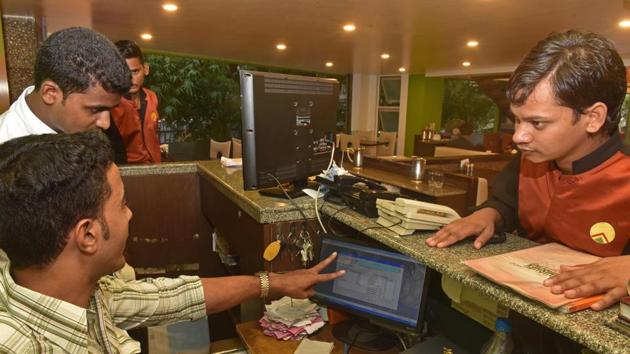Retailers slow to wake up to GST, many continue to sell at old rates
The new tax replaces a maze of state and provincial taxes and cess, unifying a country of 1.3 billion people into one of the world’s biggest common markets.
Businesses and consumers across India struggled to navigate the new Goods and Services Tax on its first day of launch on Saturday, with millions of shops and restaurants failing to record proper sales billings and consumers preferring to wait for the confusion and uncertainty to blow over.

The new tax replaces a maze of state and provincial taxes and cess, unifying a country of 1.3 billion people into one of the world’s biggest common markets.
The switchover meant businesses had to overhaul their accounting to a new format that millions of traders and merchants seemed unable to have done.
“At the gift store I went to, first they spent almost 10 minutes trying to figure out how to get a bill. Then, I was told new bill books hadn’t arrived and that I could be given a bill only if I came back in the evening or later,” said Raja Bagga, a lawyer, who made a trip to his neighbourhood market in Malviya Nagar on Saturday morning for groceries and gifts for guests.
In Kolkata, many shopkeepers said they had not switched over to GST at all.
“First, we are yet to get GST registration. Second, the GST rates on individual items are still unclear. Therefore, we are not changing the price of our products,” said an employee at a South Kolkata sweet shop that sold its products at the price it had on Friday evening.
Saturday also witnessed a blackout in sales of items such as cars and refrigerators, and retailers moderating their pre-GST discounts on products like apparel and watches.
Traders were busy till Friday night clearing pre-GST stocks. Building back stocks could take a few days, experts said. “The blackout period in sales could vary from two days to a week depending on the manufacturer. The real impact will be known only after a couple of days. We have to wait and watch,” R Muralidharan, senior director, Deloitte India, told Mint Correspondent.
Officials had warned of teething troubles when the country’s indirect taxation system was overhauled. In recent months, many traders urged the government to defer the rollout, but Union finance minister Arun Jaitley had on June 20 said that “if he (a business) is still not ready, I am afraid, but he doesn’t want to be ready”.
“In the short-term, there will be some challenges,” Jaitley had said then.
Experts supported the finance minister’s position.
“A reform like GST cannot be postponed just because a few are not ready. Some businesses will never be ready for change,” said Amarjit Chopra, former president of ICAI (Institute of Chartered Accountants of India)
On Saturday, traders in Mumbai too showed their reluctance to comply with GST.
“There is tremendous unhappiness among textile traders as this (GST) will spell doom to their sector. Hence many did not take GST numbers,” said Raichand Binakiya, leader of a collective of cloth traders based in Mumbai’s Mangaldas and Swadeshi markets.
Some prominent eateries in New Delhi were giving bills without their names or their registration number, saying they were yet to print new stationery.
Other problems on Saturday were largely about people struggling to make sense of the new tax rates.
“Customers were queuing up since morning only to check what GST rates goods will attract before deciding what to buy. This led to crowding and I had to come out and educate customers,” said Ekta Gupta, owner of a departmental store in Noida.
Madhu, an accounts manager at a beauty salon in Noida, said she had a harrowing time explaining the new tax rates to her customers since morning. “Most customers are asking why they’ll pay extra for the same services that they have used before GST”. The rate on salon services have increased from 15% to 18%.
Officers in the GST Council have said confusions regarding the tax rates can be addresses by their mobile phone application. “Download the CBEC-Mitra app. It has all that consumers and traders need”.
(With inputs from Mint, and HTC in Mumbai, Kolkata)





